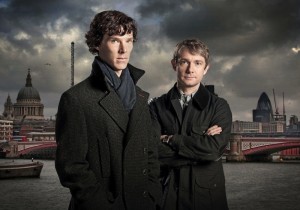You have no items in your cart. Want to get some nice things?
Go shopping
There are several different ways of making an adaptation. You could go down the 1980s Brideshead Revisited route, which is to take the entire text of the book, get Jeremy Irons to recite it and then overlay a really involved soundtrack, so it becomes essentially a radio play with costumes. Or you could take the basic concept of a novel (such as: Man solves crimes. Man talks to animals. Man falls hopelessly in love with woman) and make something that is essentially invented by you but still happens to share a title with the original work. This is the explanation for Eddie Murphy’s Doctor Doolittle film (which we do not talk about) and also the Guy Richie Sherlock Holmes films, the plots of which I suspect were the product of people shouting random words, like ‘GYPSIES! SHOOTING! WEAPONS! DISGUISE! HUMOUR! NUDITY! DOG!’ and then turning them into scenes.
But as well as these, there’s the rare adaptation that considers the essential concept behind a book, takes that and puts a twist on it, so that what comes out is interesting and new but still recognisably from the same source. (This is, incidentally, very similar to what happens in good fanfiction). This is extremely difficult to do well, and it’s a rare project that manages it – and among that elite group is the BBC’s Sherlock.
While Guy Richie’s films seek to answer the question “What would happen if Sherlock Holmes was a person who punched people in the face a lot?” The BBC wonders, far more intelligently, how the Holmes Arthur Conan Doyle actually made up would react to being alive in the twenty-first century. The answer, of course, is that he would be a technical wizard, solving crimes with iPhone and Google and publishing his monographs on his website, while Watson blogged about it.
Sherlock is a brilliant translation, not just between book and screen but between 1892 and 2012, and one of its best features is that it manages to use the technology that we see around us every day in an incredibly clever and beautifully organic way. Instead of pretending, as many shows do, that the internet doesn’t exist, leading to embarrassing scenes where characters stand there clutching their smartphones and screaming “OH GOD! THE WORLD IS DOOMED BECAUSE WE CAN’T REMEMBER THAT VITAL PIECE OF INFORMATION AND WE HAVE NO WAY OF FINDING IT OUT!”, if Sherlock doesn’t know something he checks it out (bringing the words up on our screens, too, in a fantastic use of visual space).
Part of the message of the Holmes stories is that it’s not just the information that’s important, but the deductions that you make from it – Watson always has exactly the same view of the case but because he lacks Sherlock’s superior brain activity, he can’t understand what he’s really seeing. It’s an added bonus, by the way, that the Watson of Sherlock is not the brain-dead blithering idiot of many adaptations, but something much closer to the sensible, upstanding and fundamentally good ex-soldier of the stories.
Creators Stephen Moffatt and Mark Gatiss have shown that they can both respect their source material and have a lot of fun updating it. Sherlock is filled with delightfully smart and tongue-in-cheek references to its source material. In the season two opener, Watson writes up ‘The Adventure of the Speckled Blonde’, there are thumbs in the fridge (presumably belonging to engineers) and a hilarious reinvention of the origins of the Sherlock-in-a-deerstalker image.
The stories in question, A Scandal in Bohemia and The Hound of the Baskervilles, have been adapted in ways that simply make sense. Putting all extremely knotty accusations of potential anti-Irene Adler sexism aside, an ‘adventuress’ in 1892 probably would be equivalent to a dominatrix in 2012 (fascinating, sexually suggestive, slightly outside the audience’s comfort zone). Conan Doyle’s pan-European intrigue would, of course, become international terrorism, just as the idea of a giant dog these days inevitably brings with it the suggestion of genetic engineering. It seems very likely to me that Conan Doyle, if he was alive today, would have written extensively about mutant glowing mice and jellyfish with orangutan arms. Genetic engineering has the same basic mixture of outlandish horror and creepy possibility that you find in a lot of Conan Doyle’s real stories – The Adventure of the Creeping Man, for example, or The Sussex Vampire. There’s clearly been a lot of thought put into why the Holmes stories work the way they do, and that care shows through in every episode of Sherlock.
For me, the difference between the two current versions of the Baker Street detective– and the difference between a perfectly adequate adaptation and a really stellar one – can be summed up in equivalent scenes that take place in the first Guy Richie film and Sherlock season one. Both come from the episode in one of the Conan Doyle stories where Holmes makes a deduction about a client’s entire life and character just from a look at his watch. The Richie film does a fairly good recreation of the moment, although it substitutes Watson for the hapless client, but the BBC version updates it into something far more clever. Watches these days just don’t matter to us in the same way – the equivalent, in terms of price and social value, would be an iPhone – so it’s Watson’s iPhone that Sherlock reads, deducing that the person plugging it in to charge scratched its surface with the shaky hands of an alcoholic. There’s a name engraved on the back, ‘Harry’, who Sherlock decides must be Watson’s estranged alcoholic brother. He’s right, except that the ‘Harry’ in question isn’t Watson’s brother but his (lesbian) sister. It’s a lovely bit of shorthand for the both the differences and the essential similarities between 1892 and 2012, and that mirror-image-with-a-twist runs all the way through Sherlock. “I thought you weren’t my housekeeper,” Sherlock says to Mrs Hudson in The Hounds of Baskerville. “I’m not,” she replies frostily, which is technically true – in 2012, she’s his landlady – but the joke-within-a-joke is that we know both that in the original she was his housekeeper, and that really, she still is.
I’m usually a cynic where remakes and adaptations are concerned. It’s so rare to find one that even comes close to being as good as the original – and if it is, it tends to mean that the source material is not up to much. That’s why, to me, Sherlock comes as such a delight. Of course, I’m not saying it’s better than the Conan Doyle stories it comes from. In many ways, it’s very different, which is a lot of what charms me about it. It’s just the right balance of new and old, innovation and thoughtful reference, and it’s made something that’s familiar but very unique.
Robin Stevens

About Robin Stevens
Robin started out writing literary features for Litro and joined the team in November 2012. She is from Oxford by way of California, and she recently completed an English Literature MA at King's College, London. Her dissertation was on crime fiction, so she can now officially refer to herself as an expert in murder (she's not sure whether she should be proud of that). Robin reviews books for The Bookbag and on her own personal blog, redbreastedbird.blogspot.co.uk. She also writes children's novels. Luckily, she believes that you can never have too many books in your life.




